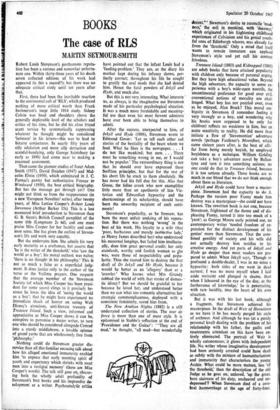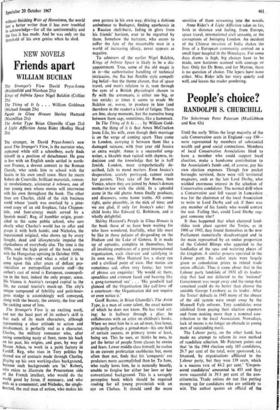The case of RLS BOOKS
MARTIN SEYMOUR-SMITH
Robert Louis Stevenson's posthumous reputa- tion has been a curious and somewhat unfortu- nate one. Within thirty-three years of his death seven collected editions of his work had appeared (is this a record?); but there was no adequate critical study until ten years after that.
First, there had been the inevitable reaction to the sentimental cult of `RLS', which produced nothing of more critical worth than Frank Swinnerton's inept little 1914 study. Sidney Colvin was head and shoulders above the generally deplorable level of the scholars and critics of his time, but he did his close friend scant service by systematically suppressing whatever he thought might be considered `intimate' in his letters—this was to lead to bizarre conjectures. In nearly fifty years of silly adulation and more silly detraction and scandal-bandying, only George Saintsbury (as early as 1896) had come near to making a reasoned assessment.
Then came the pioneer studies of Janet Adam Smith (1937), David Daiches (1947) and Mal- colm Elwin (1950), which culminated in J. C. Furnas's pawky but authoritative Voyage to Windward (1950), the best critical biography. But has the message got through yet? One might not think so from the reappearance (in a new 'European Novelists' series), after twenty years, of Miss Lettice Cooper's Robert Louis Stevenson (Arthur Barker 15s). This is a less mannered brief introduction to Stevenson than G. B. Stern's British Council pamphlet of the same title (Longmans 2s 6d), and one must praise Miss Cooper for her lucidity and com- mon sense. She has given the outline of Steven- son's life and work very capably.
But she underrates him. She admits his very early maturity as a craftsman, but asserts that 'he is the writer of the threshold,' who 'saw the world as a boy'; his moral outlook was naive; 'there is no thought in his philosophy.' This is not so much a false as a superficial judg- ment. It does justice only to the author of the verse or the Vailima prayers. One suspects that the average member of the Stevenson Society (of which Miss Cooper has been presi- dent for some years) clings to it precisely be- cause he loves the idea of 'seeing the world as a boy'; that he might have experienced no immediate shock of horror on seeing Walt Disney's atrocious, anti-literate travesty of Treasure Island. Such a view, informed and appreciative as Miss Cooper shows it can be, conspires to patronise a major writer, to turn one who should be considered alongside Conrad into a sturdy middlebrow, a lovable spinner of grand yarns that are wholesomely free from `philosophy.'
Nothing could do Stevenson greater dis- service than all this familiar excusing talk about how his alleged emotional immaturity enabled him `to express that early morning spirit of youth and expectancy which shrinks with most men into a vestigial memory' (these are Miss Cooper's words). The talk still goes on, obscur- ing both the wholly adult profundity of Stevenson's best books and his impressive de- velopment as a writer. Psychoanalytic critics have pointed out that the infant Louis had a 'feeding-problem.' They are, as the diary his mother kept during his infancy shows, per- fectly correct; throughout his life he sought to gratify the oral needs that she had denied him. Hence the fatal powders of Jekyll and Hyde, and much else.
But this is not very interesting. What interests ' us, as always, is the imaginative use Stevenson made of his particular psychological situation. It was a much more formidable and meaning- ful use than even his most fervent admirers have ever been able to bring themselves to admit.
After the success, unexpected to him, of Jekyll and Hyde (1886), Stevenson wrote to Edmund Gosse: 'Let us tell each other sad stories of the bestiality of the beast whom we feed. What he likes is the newspaper. . . . I do not like mankind; but men. . . . There must be something wrong in me, or I would not be popular.' The extraordinary thing is not that he should ever have expressed these Swiftian principles, but that for the rest of his short life he stuck to them absolutely. He has never had his full due for this. Alas that Gosse, the feline crook who now exemplifies little more than an apotheosis of late Vic- torian and Edwardian hypocrisy and the shortcomings of its scholarship, should have been the unworthy recipient of such senti- ments!
Stevenson's popularity, as he foresaw, has been the most unfair undoing of his reputa- tion. But there was nothing 'wrong' in the best of his work. His loyalty to a wife (that 'poor, barbarous and merely instinctive lady,' as Henry James described her) who understood his maternal longings, but failed him intellectu- ally, does him great personal credit; her only standards, worthy and foolish woman as he was, were those of respectability and popu- larity. Thus she caused him to destroy the first draft of Dr Jekyll and Mr Hyde, because it would be better as an 'allegory' than as a 'crawler.' Who knows what Mrs Grundy robbed the world of with that stroke of domes- tic idiocy? But we should be grateful to her because he loved her, and understood better than we can what too romantic alternatives her strategic commonplaceness, deployed with a consistent femininity, saved him from.
The New Arabian Nights (1882) is a still underrated collection of stories. The tour de force is more than one of mere style. It is epitomised in Stubbs's reflection at the end of `Providence and the Guitar': "'They are all mad," he thought, "all mad—but wonderfully
decent."' Stevenson's desire to reconcile 'mad- ness,' the evil in mankind, with 'decency,' which originated in his frightening childhood experiences of Calvinism and his genial youth. ful ones of Edinburgh whores, was already far from the 'threshold.' Only a mind -that itself wants to remain immature can applaud Stevenson's style and yet call his content frivolous.
Treasure Island (1883) and Kidnapped (1886) are adult books that have attained popularity with children only because of parental urging. But they have high educational value. Beyond the high adventure, the capacity to sense ex- perience with a boy's wide-open nostrils, the unsentimental preference for good over evil, conventional notions of morality are chal- lenged. What boy has not puzzled over, even as he enjoyed, Alan Breck? This moral am- biguity in Stevenson (I remember feeling it very strongly as a boy, and wondering why his books were supposed to be only for children) reflects no weakness in him, but an acute sensitivity to reality. He did more than initiate a flow of `Stevensonian' adventure novels (perhaps Faulkner's Moonfleet, which came sixteen years after, is the best of all): far from being merely boyish, he employed boyishness as a technique. William Golding can take a boy's adventure novel by Ballan- tyne and turn it into something serious; no one could do that to Treasure Island, because it is too serious already. These books are so much in our blood that we do not think enough about them as literature.
Jekyll and Hyde could have been -a master- piece. Stevenson had the capacity to do it. Perhaps the version poor Fanny made him destroy was a masterpiece—she could not have known. The rewritten book is not one, because Stevenson, frightened of the theme and of dis- pleasing Fanny, turned it into too much of a `yarn'; as George Moore early pointed out, no contemporary writer 'needed freedom of ex- pression for the distinct development of his genius' more than Stevenson. That the com- bined gentility of society and his wife did not actually destroy him testifies to his creative energy. And yet parts of Jekyll and Hyde go deeper than most readers are pre- pared to admit. When Jekyll says, 'Though so profound a double-dealer, I was in no sense a hypocrite: both sides of me were in dead earnest; I was no more myself when I laid aside restraint and plunged in shame, than when I laboured in the eye of the day, at the furtherance of knowledge,' he is penetrating, with rare lucidity, into the heart of his own situation.
But it was with his last book, although a fragment, that Stevenson achieved his masterpiece. In the draft of Weir of Hermiston as we have it he has nearly purged his style of archness. And although he was (at a purely personal level) dealing with the problem of his relationship with his father, the guilts and resentments attendant on this have been en- tirely eliminated. The portrait of Weir is wholly autonomous; it glows with independent life. No writer whose imaginative development had been seriously arrested could have dealt as subtly with the mixture of humanitarianism and immaturity that characterises the young Archie. What could be more mature, less 'of the threshold,' than the description of the old Judge as he goes on, unloved, 'up the great, bare staircase of his duty, uncheered and un- depressed'? When Stevenson died of a cere- bral haemorrhage at the age of forty-four, without finishing Weir of Hermiston, the world lost a better writer than it has ever troubled to acknowledge—for all the sentimentality and the fuss it has made. And he was only on the threshold of his own genius when he died.



































 Previous page
Previous page